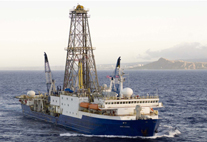Hamburg Geologist as Co-Chief of the Ocean Drilling Research Ship “JOIDES Resolution”
5 August 2014, by Franziska Neigenfind

Photo: IODP - International Ocean Discovery Program
62 days at sea, cruising around the Maldives – it may sound like a vacation, but in fact it’s hard work...
62 days at sea, cruising around the Maldives – it may sound like a vacation, but in fact it’s hard work. The goal of the scientific expedition, part of the International Ocean Discovery Program (IODP), is to gain new insights into the development and stability of the tropical monsoon climate. Prof. Christian Betzler from the Center for Earth System Research and Sustainability will serve as Co-Chief of the expedition.
More than 30 researchers from the USA, Japan, Europe and other member countries will join in on the expedition from October to November 2015. Participation slots were much sought after and awarded on the basis of strict criteria. Climatologists and paleoclimatologists are especially interested in the sediment samples that the specially equipped ship will collect from seafloor locations scattered around the Maldives and from as far down as one kilometer.
“We now know quite a bit about how the monsoon has evolved over the last 100 to 1,000 years,” reports the geologist and expedition leader Christian Betzler. “We can see the evidence in sediments from dripstone caves.” These, he claims, are fairly easy to access; however, they don’t offer sufficient information to tell us whether or not current changes in the monsoon pattern are due to climate change or just natural fluctuations. In contrast, the samples gathered by the JOIDES Resolution will include sediments reaching back 100,000 to 15 million years. “In our experience, the sediment layers in this area very accurately reflect climatic changes and offer high temporal resolution – for us researchers, they’re an absolute dream.”
Prof. Christian Betzler works at Universität Hamburg’s Institute of Geology, one of the nine university institutes and facilities that comprise the Center for Earth System Research and Sustainability.
